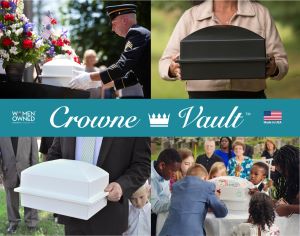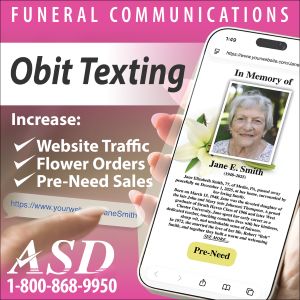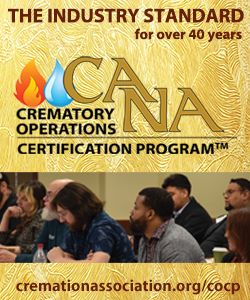Indiana Court: “Death Doula” does not need a funeral director license

According to this issue of the Indianapolis Star an Indiana court of appeals ruled in late August that the State of Indiana “violated the First Amendment rights of a Fort Wayne “death doula” after it required her to obtain a funeral director license to provide end-of-life transition services”.
Indiana state (mortuary) regulators had argued that a business owned by Lauren Richwine called “Death Done Differently” was operating in a manner that required a state funeral license and had previously moved for a “cease-and-desist” order for that business.
The court ruled that ” her business does not offer services under the scope of such a license, and by asking her to cease to provide the bulk of her services, the state is infringing on her right to free speech.”
According to the article, Richwine and the state differed on what duties they considered to be the responsibility of a licensed funeral director. The article states, “A funeral director arranges for the removal of a dead body, prepares the body, files death certificates, assists with death benefits and directs funeral ceremonies, according to the Indiana Funeral Directors Association. Obtaining a license requires schooling, exams, an apprenticeship and various fees.”
Again, according to the Indianapolis Star article, Richwine countered by inferring that “(her) practice consists of consulting with clients to plan and support end-of-life planning. . . She advises clients on post-death procedures, components of the funeral service and burial options. She also provides general advice to ease stress and provide support.”
The circuit court said “the state’s enforcement of the Indiana Code was too broad and limiting such access to information qualified as “overregulation.”
They also commented that “… (We) do not see how the statute furthers the state’s interest in consumer protection by depriving its citizens of the opportunity to have a neutral third party assist survivors in selecting which items and services to purchase from a funeral home.”

Tom Anderson
Funeral Director Daily
Funeral Director Daily take: This is not the end to this case which, according to the article started when a “member of the funeral services industry alleged Ms. Richwine was unlawfully practicing as a funeral director”.
I believe that there has to be some regulations around the mortuary science profession, especially when it comes to handling the remains. However, I also believe that there is room for somebody like a “Death Doula”, “Event Planner”, or “Funeral Concierge” to operate a business that helps those with little knowledge of how the business operates navigate the decisions that have to be made.
It’s my opinion that some of the market for these types of third-party helpers could be limited if funeral homes were more open about their pricing and systems of operations. And, it is not only funeral homes that are a little opaque in giving the consumer public information to make informed decisions. I think the Federal Trade Commission (FTC) muddies up the dynamics of funeral service in the way they seem to want “General Price Lists” detailed for consumers.
I’m of the opinion that “Death Care Decisions” are sub-consciously divided into three categories by the average consumer. Again, it is my opinion that services and prices would be easier understood by the consumer, requiring less third-party intervention, if they were arranged in packages of these types:
- Disposition of the Body (Traditional Burial, Green Burial, Cremation, Alkaline Hydrolysis, Natural Organic Reduction, etc)
- Services/Celebrations (Private or public visitation, church service, other memorial service, luncheons, receptions, etc)
- Memorialization (Cemetery, monuments, entombments, Better Place Forest, scattering, Parting Stone, Cremation Jewelry, etc)
And, I think the Federal Trade Commission should move in this direction with the note to consumers that the “Disposition of the Body” portion requires a licensed funeral director involvement. The other components (Services/Celebrations/Memorialization) may or may not require the services of a licensed funeral director — dependent on the choice made.
Until the Death Care profession can get consumers to easily understand the services and prices that we offer, the traditional death care providers are simply asking for more competition by Death Doulas, Funeral Concierges, and the like who will offer these “helping hand” services to confused consumers.
More news from the world of Death Care:
- Durham professor honored for pioneering contributions to Death Studies. Durham University (Great Britain)
- Judge says Texas veteran deserves funeral director license. So did fired funeral agency staff. Houston Public Media (TX)
- When I go, I’m going green. KFF Health News
Enter your e-mail below to join the 3,201 others who receive Funeral Director Daily articles daily
“A servant’s attitude guided by Christ leads to a significant life”




















